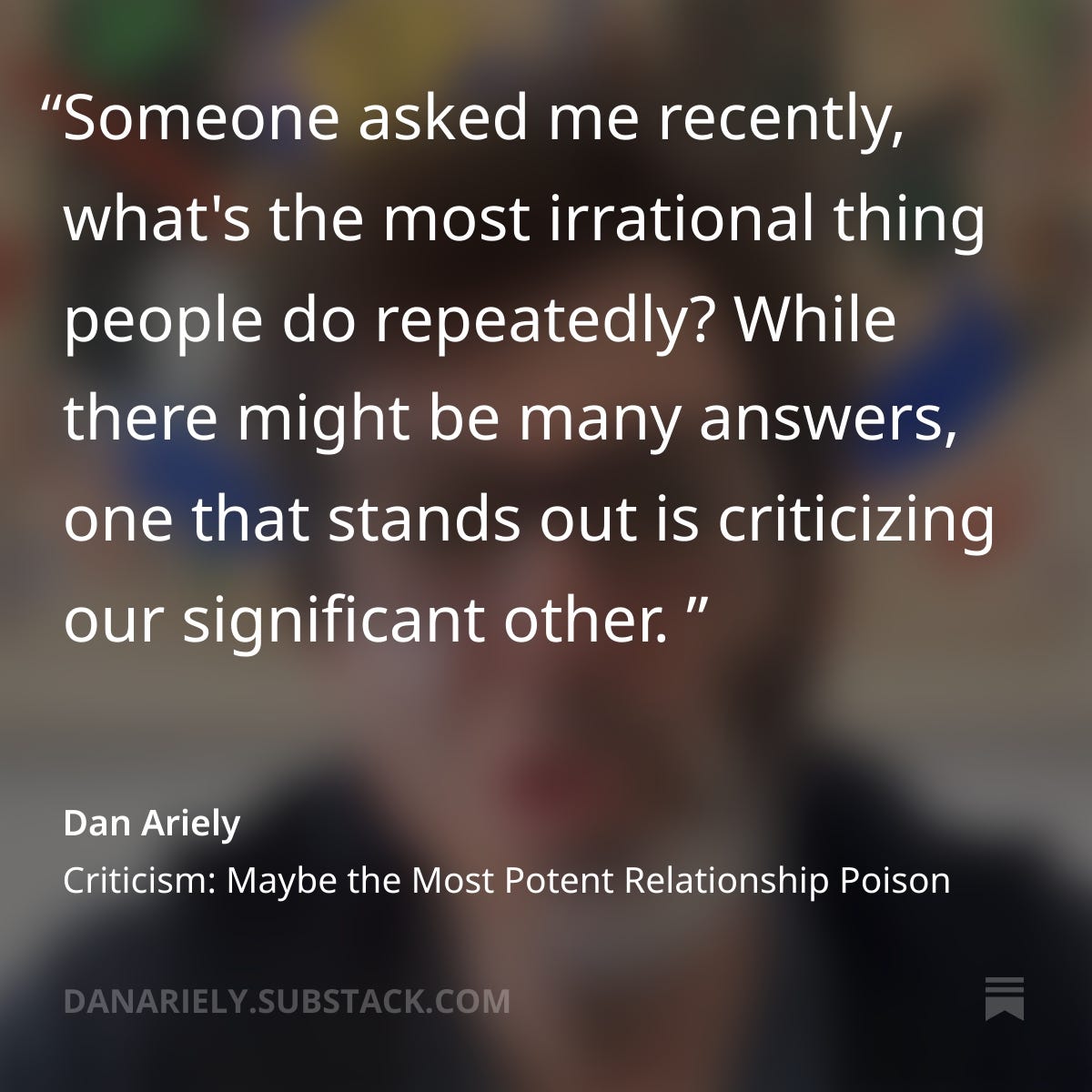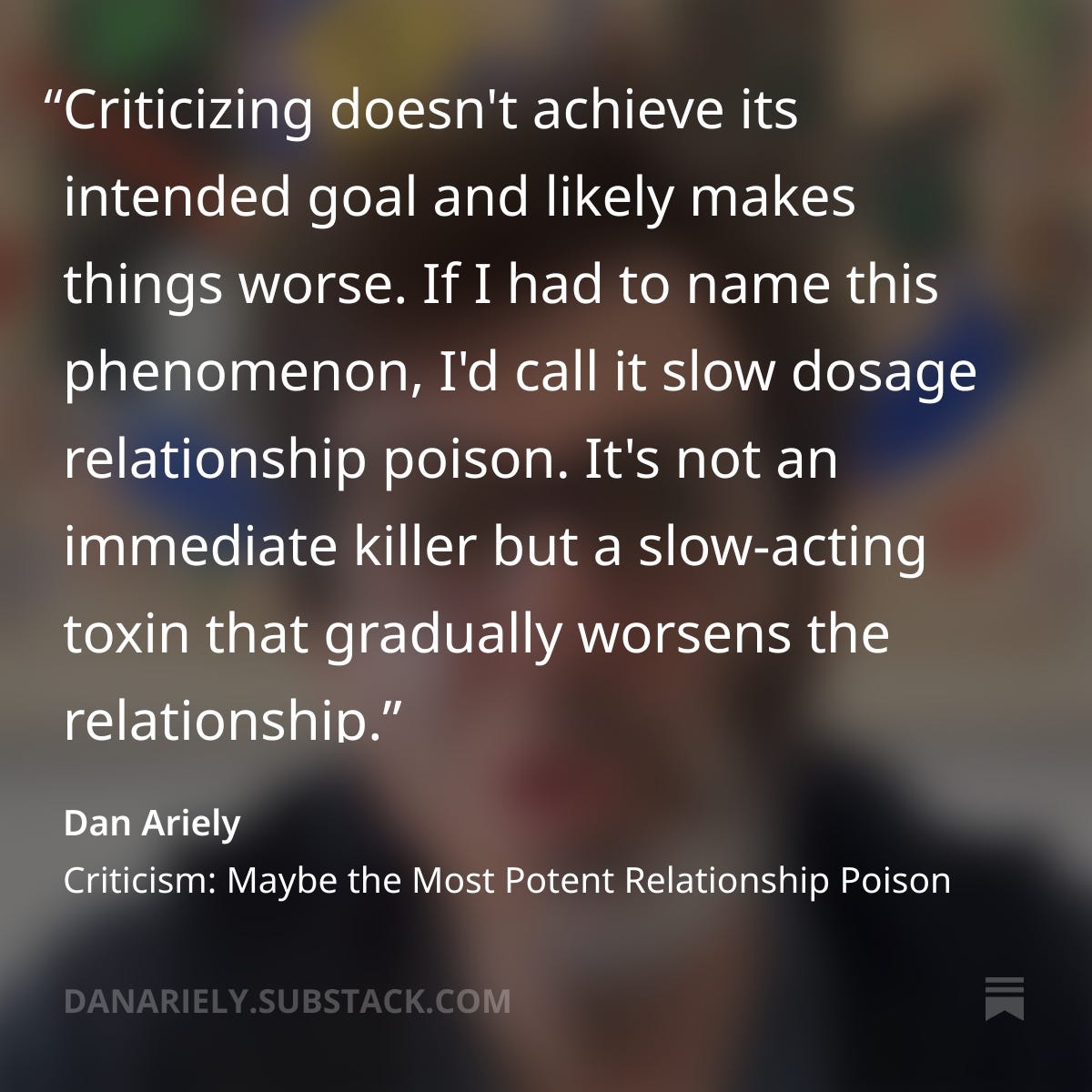Most Irrational Relationship Behavior; What isn't a Confession of Failure
And becoming less vulnerable to disease, analyzing Musk's communication to federal workers and a big interview question and how to respond to it
Welcome to Weekly Finds, from writers, articles and Notes on Substack. I couldn’t include everything “great” I found. Here are this week’s top picks:
Source: Dan Ariely Looks at Life newsletter
In this find, Ariely says that it’s irrational to constantly criticize our significant other because it rarely proves helpful and he adds, it’s more about expressing frustration and anger than it is about inspiring “improvement.”
“Relationship poison” and “slow-acting toxin.”
I need the wide-eyed emoji right here. That’s vivid language.
He’s correct though, the more we criticize, the more we unintentionally damage and eventually ruin positive feelings, a sense of togetherness, respect, love and attraction.
We all likely know someone who just can’t bring themselves to say, in a particular situation, “I was wrong” or some other clear, direct form of that statement. Whether that’s due to too much pride, insecurity, too big of an ego or crippling fear, that aren’t willing to communicate it.
Yet, as Adam Grant says, it’s not an example of weakness to say it and it doesn’t mean a person is a failure. It is instead an obvious display of having noble character, being honest and showing, believe it or not, strength.
Source: Jorg Mardian, RHN, writing at his Substack, Strong Health
Article: Fast Food: A Tasty Death Sentence?
What captured my attention was, “we can build a body that’s less vulnerable to disease” and “the structure and vitality of our ‘home: our body.’”
Being less vulnerable to disease is positive phrasing and what I, and I imagine most people, want for themselves and those they love. Recently, I received some very surprising (alarming even) blood work results while being tested for a painful condition so maybe that’s why this resonated with me.
I also think it’s a very powerful visual, calling our body “our home.” Most of us want to live in as nice a place as we can afford and make it. We may not be able to control everything with our health but what we can, maybe we should look at it differently, as in making our “home” as nice as it can be.
We know this already yet it’s an important, evergreen reminder. Hopefully, our future selves won’t be angry at ourselves and will instead, respect us and thank us for taking care of our health.
Weekly Finds is a special feature of Communication Intelligence.
Favorite Quotes from this Week’s Interviews
“A lot of highly intelligent, results-driven people tend to have very little patience for diplomacy — and over time — people stop expecting it from them,” says Nikita Khandheria, founder and CEO at Eria Food.
Source: Musk's Communication to Federal Workers Examined
Who he is, what would help and how employees can best respond
“I don’t think the answer is trying to change how he communicates,” Khandheria says. “Instead, it’s about having someone act as a translator, someone who understands that he prefers to get straight to the point and can relay his ideas in a way that resonates with his audience.”
This could reduce the current heated emotions, conflict, unwanted optics and criticism. “If Musk had an assistant who could do this, they could take his core message and frame it differently,” Khandheria recommends.
“It’s about finding the right person to bridge the gap,” Khandheria stresses. “Someone who can absorb his fast-paced, no-nonsense approach and then reframe it in a way that keeps people motivated instead of making them feel like they’re being interrogated or put under a microscope.”
“Employees who resist his methods just because they disagree with them will struggle to gain his respect. Instead of pushing back, the best approach is to engage with the process and demonstrate their value.”
“‘Here’s what I’ve done, and here’s what my team and I are planning next’,” Khandheria recommends. “Musk values people who don’t just check boxes but actively push things forward.
"What do you think we're doing wrong at our company?"
It’s bold question and unlikely one all candidates anticipated. It could them off balance emotionally.
Source: Responding Best to an Invitation-to-Critique Interview Question
Learning how prospective employees go about problem solving
“This is actually a brilliant question. It’s direct, to the point and tells you a lot about how a candidate handles pressure,” says Christian Hed, the chief marketing officer at Dstny, a European provider of cloud-based business communications solutions.
“It could also be an opportunity to show the skills of strategic thinking of a candidate.”
“The main thing here is don't get defensive or freeze,” he advises. “Try and answer as constructively and as positively as you can.”
“Personally I would prefer a candidate's response that showed me the depth of understanding of the company’s challenges and a vision for improvement,” Hed reveals.
He shares what would impress him in a reply.
“I will pick someone who is able to offer solutions along with the problems over someone who just dishes out the flaws,” Hed says. “The main thing to look for here is, is the candidate able to engage in a solution-oriented dialogue?”
"How you deliver that answer is as important as what you deliver," she says. Communicating, "well, you suck at these five things," or something similar is not going to land well with the interviewer.
What she’s seeking, Gore says, is for a candidate to say something like, "here's a growth area that I would recommend," she says, because that type of researched, thoughtful response is not condescending and can help the company.
“Don't just sit there and do the finger pointing at problems. Offer solutions. Think of solutions,” Hed advises. “The right approach should feel like you’re joining forces to improve the company. If a candidate responds like that, it shows confidence, respect and ability to manage stress: things that a company looks for in leadership roles."








